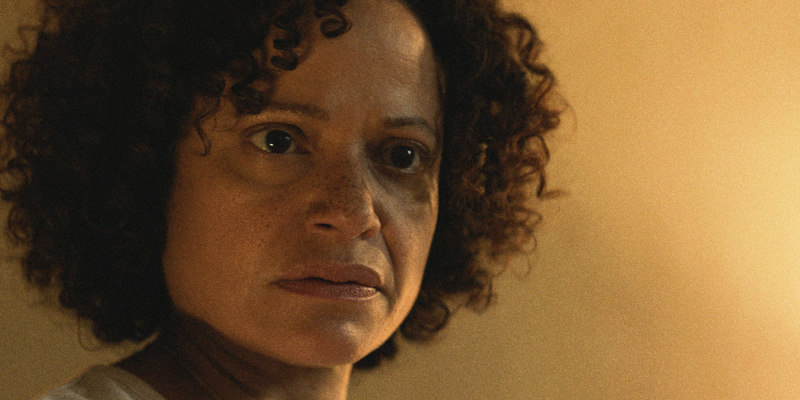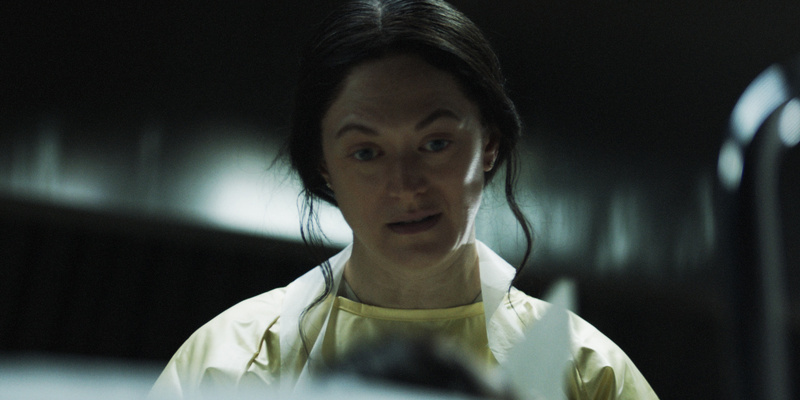
Review by
Eric Hillis
Directed by: Laura Moss
Starring: Marin Ireland, Judy Reyes, A.J. Lister, Breeda Wool, Monique Garbiela Curnen, Rina Mejia,
Grant Harrison, LaChanze

Laura Moss's directorial debut Birth/Rebirth arrives
amid a current wave of movies inspired to some degree by the Frankenstein
story. We've seen
The Angry Black Girl and Her Monster
and
Poor Things, while Guillermo del Toro and Maggie Gyllenhaal are both set to deliver
rival adaptations of Mary Shelley's classic tale. What's behind this sudden
obsession? Some heave suggested it reflects our current concerns with AI,
and the likes of techno-thrillers
M3GAN
and
T.I.M.
would certainly support this thesis. But some of these movies seem to have a
more human, arguably feminist concern. Like Poor Things
and The Angry Black Girl and Her Monster, Birth/Rebirth is about a woman who wants to be recognised,
even if she has to take extreme measures.
Played by indie horror stalwart Marin Ireland, Rose is both the
protagonist and antagonist of Birth/Rebirth, a figure we initially view as a monster but later come to respect her
genius. Isn't this the arc of all great scientists?

Rose works as a hospital pathologist, buried away in the basement morgue
with a sunny colleague whose attempts at chit chat she has no time for.
Rose, you see, is a genius, one who is on the verge of the greatest
scientific breakthrough ever. She's already managed to figure out how to
bring a pig back from the dead. Now, if only she had a human subject.
The worst thing that could happen to a mother proves a gift to Rose when
Lila (AJ Lister), the five-year-old-daughter of Celie (Judy Reyes), a nurse at Rose's hospital, passes away unexpectedly. On examination,
Lila proves perfect for Rose's experiment. The mad doctor steals the child's
body and takes it home. Suspicious of Rose's odd behaviour, Celie follows
her home and makes a shocking discovery - Lila is breathing!

Rather than attack Rose for using her daughter as an experiment, Celie
considers Lila's resurrection a miracle. "It's merely good science and hard
work," Rose corrects her. The trouble with Rose is that she's not a nurse.
While she might know how to reanimate life, she's clueless as to how to care
for that life. Celie willingly becomes Rose's Igor, moving into her
apartment so she can help with Lila's rejuvenation.
There are blackly comic moments in the relationship that develops between
Rose and Celie, a decidedly odd couple who bicker over trifling matters like
whose turn it is to wash the dishes, all while in the process of history's
greatest scientific breakthrough. Rose is socially inept and views the world
through a cold, factual lens. Celie couldn't be more different. As a nurse
we see how her primary concern is to make women feel comfortable in the
hands of doctors who will happily cut their stomachs open if it means they
get finished by lunch. The dynamic between the two women suggests that
there's more to motherhood than merely creating life.

Like so many movies that put two very different women in a close
relationship, there's something of Bergman's Persona in Moss's
film. Rose and Celie have a disparate influence on one another. In Celie's
presence Rose becomes more human, even lowering herself to making small talk
with her put upon morgue assistant. Celie on the other hand develops a
ruthless streak when it becomes clear that her daughter's continued
resurrection may rely on human sacrifice. By the end the two women have met
in the middle but may be heading in different directions.
Without giving away specifics, that ending may prove frustrating for
viewers. Like William Oldroyd's
Eileen
(which also starred Ireland in a supporting role), it's a film about a
calculated woman who turns an innocent into a monster. Both films also end
at the point where it seems their narrative is about to go up a gear, as if
they've had their third acts snipped off by a projectionist who wants to get
the film unspooled in time for last orders at the pub next door. You can
argue that Birth/Rebirth is playing with Frankenstein
conventions to such a degree that the viewer can easily fill in the blanks
themselves, but frankly, I'd rather watch Laura Moss's version than one
conjured by my own limited imagination. You can't help but feel a little
cheated that you're being denied the chance to see just where Rose and
Celie's relationship is headed once they've crossed a certain moral line.
Perhaps they'll be resurrected for a sequel.

